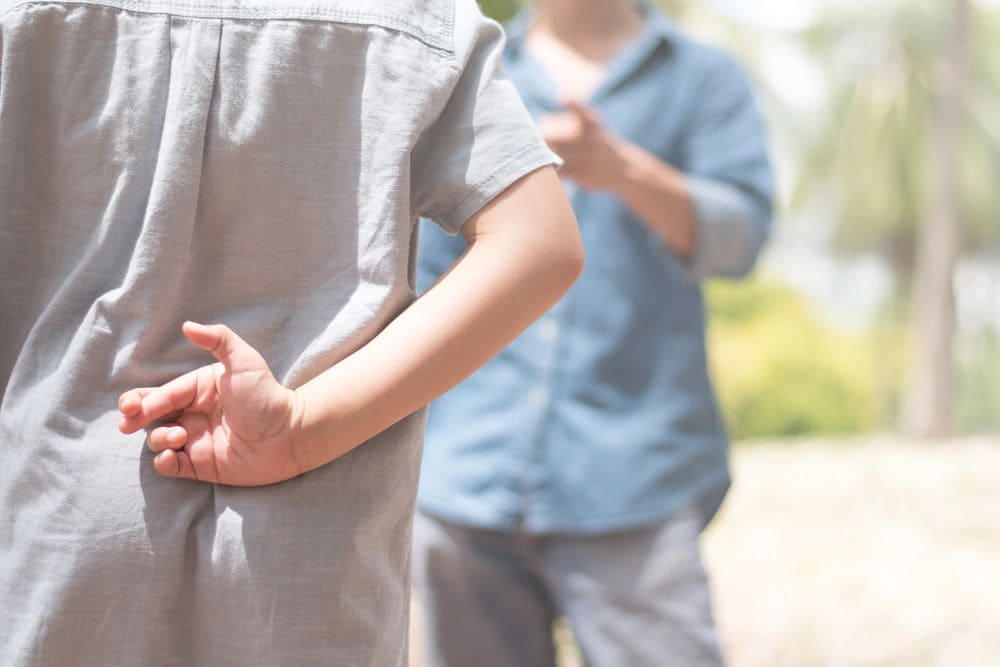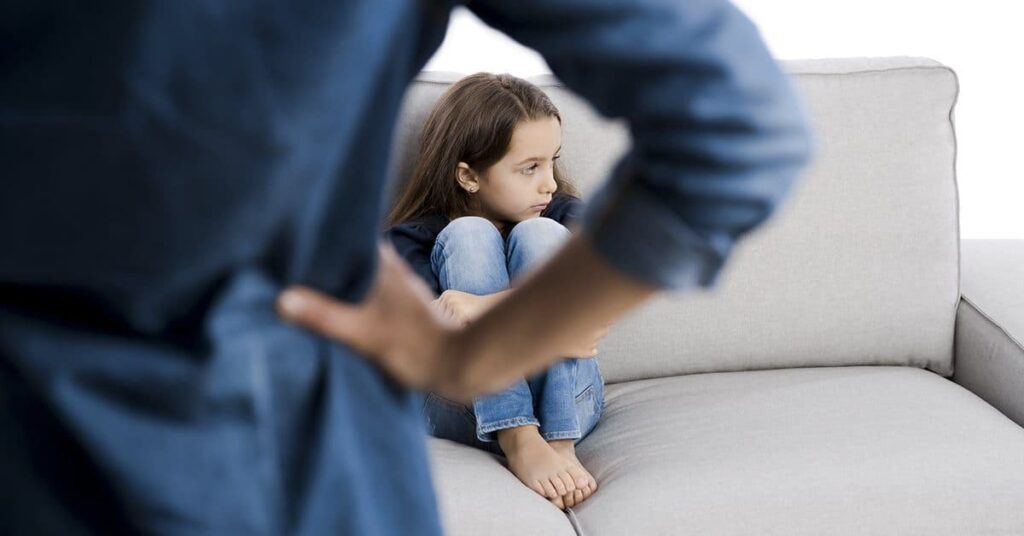As parents, we all want our kids to grow up being honest with others because it is the foundation for any healthy relationship. However, even figuring out why a kid lies and how to respond can seem impossible.
This article will cover some common reasons why a kid lies and reveal subtle signs your kid is lying. Additionally, we will share actionable tips on how to stop children from lying to you.
Equipped with these ideas; we shall be able to establish an atmosphere that not only encourages truth-telling but also breeds trust among family members.
5 Common Signs Your Kid Is Lying To You
Understanding why a kid lies requires you first to detect their lies. Detecting a child’s lie can be difficult as they often show very few overt signs. However, some common red flags might indicate deceitfulness better for parents and guardians.

Here are five signs your kid is lying to you:
1. Various Narratives
Kids who tell lies are usually unable to maintain consistency in their stories. When asked more than once, they may give different accounts of an incident, or fail to show logical coherence in their narration.
If your child claims to have been at a friend’s place and later talks about something that occurred at a park within the same period, it could mean they are making up the story.
2. Lack of Eye Contact
Many children cannot look straight into someone’s eyes when telling lies. They may turn their gaze away, blink frequently, or shift their eyes from one point to another.
So if your son or daughter suddenly starts avoiding direct eye contact with you while responding to questions regarding something suspicious, it might be an indication that he/she is not being honest.
3. Abnormal Body Language
One’s body language can give them away even without uttering a word. Signs such as restlessness through fidgeting, scratching oneself unnecessarily, playing around with objects nearby, and adopting closed postures like crossing arms which imply unease could also suggest deceitfulness.
Thus if usually calm but become unusually fidgety or keep on scratching their nose while answering a query; then this conduct might indicate lying on his/her part.
4. Very Detailed or Too General Explanations
People who lie tend to either overuse details so as to make their falsehood seem credible enough – or else provide responses lacking any specifics whatsoever for fear of getting caught up in them.
For instance; when asked simple questions such as “Where did you go?” Your kid might come up with an elaborate story containing lots of unnecessary information that does not answer directly.
5. Change of Voice Tone/Pace
The way somebody speaks can change which is one of the tell-tale signs your kid is lying to you; some kids talk faster while others slow down too much, some alter their pitch too high or low – others even start stuttering where normally speak fluently.
Hence if your child’s voice suddenly becomes higher pitched than usual or begins speaking faster than normal in response to certain questions; then these could be signs that she is not telling the truth.
Read More: 10 Power-Packed Parental Tips for Preschoolers: Ignite Your Child’s Growth
5 Awful Reasons Why A Kid Lies To You
Recognizing the reasons why a kid lies to you is important in dealing with them and establishing an environment of truthfulness at home.

Here are five reasons why a kid lies to you that are especially worrisome, explained in detail:
1. Fear of Punishment
Your child may lie because they dread the direct and possibly terrible consequences of their actions. This fear may come from the earlier situations when being truthful resulted in severe penalties or bad outcomes.
In case they expect you to react harshly, they can go for dishonesty as a shield against themselves. What makes it more disturbing why a kid lies is that it shows your child does not feel secure or supported enough to admit his mistakes.
With time, lying based on fear like this may destroy trust between the two of you thus creating a hostile atmosphere where he thinks that hiding every step is the only way to avoid your punitive methods.
2. For Approval or Attention Seeking Reasons
To receive your approval, recognition, attention, etc., especially when feeling ignored or inadequate kids tend to lie. This kind of falsehood often indicates low self-esteem problems and the need for affirmation.
If they feel unnoticed or undeserving, they can make up stories about themselves or things done so that they could be appreciated more by you and get compliments from you too.
Such reasons why a kid lies carry much weight since it signifies a lack of confidence in oneself and belief that unless someone else pretends then love will not be found in you
3. For the Sake of Not Being Humiliated
One of the other reasons why a kid lies to you is to avoid being humiliated, a frequent strategy for those who feel they are susceptible to peer pressure or afraid that their parents will judge them negatively.
They tell this type of lie as a defense mechanism meant to save them from shame, ridicule or loss of self-esteem.
When people fear exposure or embarrassment, they tend to create imaginary situations and deny the truth so as not to spoil their self-perception. This is doubly disturbing because it implies low self-regard alongside the dread of showing one’s true colors.
4. To Control Circumstances
Children can also use lying to control situations better since they realize what works for them in different scenarios. This reason why a kid lies it shows that an individual deliberately manipulates others through falsehoods with specific intentions in mind.
When your child tells lies to get something that he/she wants or evades doing a task that s/he dislikes performing; this indicates disrespect towards authority and readiness to cheat others for personal benefits.
They might make this into their regular approach if children find out that 9always telling lies helps achieve desired outcomes.
5. The Act of Modeling
She might be imitating you or any other adult with whom she interacts when your child lies. Little white lies are justified or deceitful behaviors engaged in by them that they frequently see you or another influential person doing may cause them to regard telling lies as alright, or even obligatory.
This reason why a kid lies is particularly worrying because their imitation does not take the form of a single act; instead, they learn to lie within a context where other types of conduct are taught through role models.
Such acquired conduct has enduring effects which can be hard to reverse and these may continue affecting one’s honesty and trustworthiness.
As parents, we should watch how we behave around our kids and work towards making truthfulness a central value within our family. Demonstrating honesty helps children appreciate its significance in establishing and keeping healthy relationships.
Read More: 10 Effective Ways to Help Adolescents Deal with Mood Swings During Puberty!
How To Stop Children From Lying
Patience, consistency, and understanding are needed for children to develop honesty as a value. Understanding your role in why a kid lies to you is crucial if you want to address this issue.

Below are some helpful tips on how to stop children from lying:
1. Make a Secure and Encouraging Atmosphere
Create a relationship where your child feels safe to talk about his or her emotions and admit his or her mistakes without worrying about being punished severely. Stay calm and open-minded when he or she confesses; let them know that honesty is appreciated.
2. Serve as an Example of Honesty
Show what it means to be truthful through your actions and the way you interact with others. Modeling truthfulness is one of the most effective ways to teach children this value since they tend to imitate their parents’ behavior.
3. Avoid Severe Punishments
One of the best ways how to stop children from lying to you is to avoid hard punishment. Instead of concentrating on the fault alone, discuss with the child what could result from such actions and why telling the truth matters.
Whenever your kid opts for honesty, celebrate it by giving compliments which will encourage more of such behavior in the future.
4. Teach Problem-Solving Abilities
Teach alternative ways of dealing with situations without lying by discussing different methods that could have been used in place of dishonesty.
Make clear your expectations concerning truthfulness while also stating consequences for falsehoods consistently each time they occur.
5. Talk About Lying Consequences
Help him realize how trust is affected by deceitfulness within relationships both immediate and long-term; also show its impact on other people’s lives too near him/her. Watch out for areas or feelings which might provoke untruthfulness then address any underlying problems or fears that may be troubling your child.
By applying these approaches consistently along with maintaining supportiveness plus understanding, we can assist our children in developing integrity as a core principle while strengthening the trust-based relationship between us through openness
Read More: 10 Effective Consequences for Kids’ Bad Behavior You Need To Use!
A Word From Mind Family
Understanding why our kids might lie and learning to spot the signs is crucial in guiding them toward honesty and building trust. As parents, we’re all on this journey together, navigating the challenges of raising truthful children in a complex world.
When you notice inconsistencies in their stories or see them avoiding eye contact, it’s an opportunity to delve deeper with empathy and understanding. We can create a safe space where our children feel comfortable sharing their feelings and mistakes without fear of harsh judgment or punishment.
Together, we can foster a culture of openness and trust, laying a foundation for strong, healthy relationships with our children. We can empower them to navigate life with honesty and integrity through patience, consistency, and supportive guidance.
Frequently Asked Questions (FAQs)
1. What are the common signs your kid is lying?
Signs include inconsistent stories, avoidance of eye contact, unusual body language, overly detailed or vague explanations, and changes in vocal pitch or speech patterns.
2. Why a kid lies to you?
Reasons include fear of punishment, seeking approval or attention, avoiding embarrassment, manipulating situations, and modeling behavior observed from adults.
3. How to stop children from lying?
Create a supportive environment, model honest behavior, avoid harsh punishments, praise honesty, teach problem-solving skills, set clear expectations, discuss consequences, address underlying issues, seek professional help if needed.












Leave a Reply